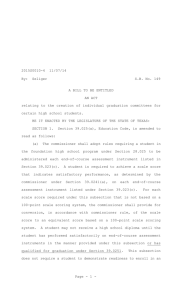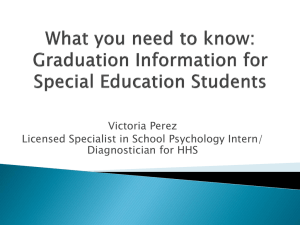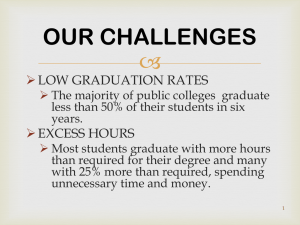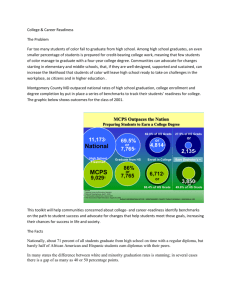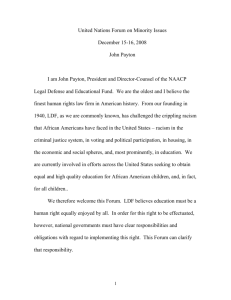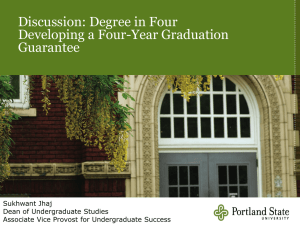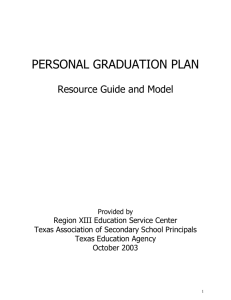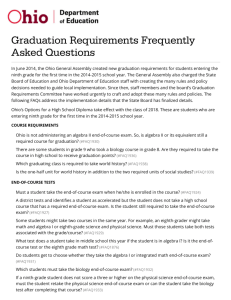SB00149I
advertisement
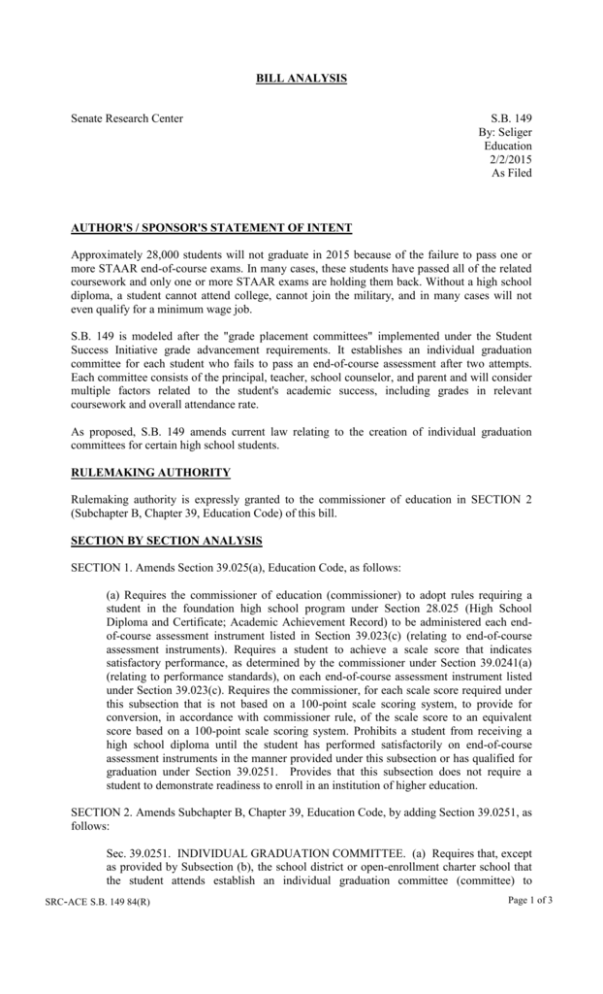
BILL ANALYSIS Senate Research Center S.B. 149 By: Seliger Education 2/2/2015 As Filed AUTHOR'S / SPONSOR'S STATEMENT OF INTENT Approximately 28,000 students will not graduate in 2015 because of the failure to pass one or more STAAR end-of-course exams. In many cases, these students have passed all of the related coursework and only one or more STAAR exams are holding them back. Without a high school diploma, a student cannot attend college, cannot join the military, and in many cases will not even qualify for a minimum wage job. S.B. 149 is modeled after the "grade placement committees" implemented under the Student Success Initiative grade advancement requirements. It establishes an individual graduation committee for each student who fails to pass an end-of-course assessment after two attempts. Each committee consists of the principal, teacher, school counselor, and parent and will consider multiple factors related to the student's academic success, including grades in relevant coursework and overall attendance rate. As proposed, S.B. 149 amends current law relating to the creation of individual graduation committees for certain high school students. RULEMAKING AUTHORITY Rulemaking authority is expressly granted to the commissioner of education in SECTION 2 (Subchapter B, Chapter 39, Education Code) of this bill. SECTION BY SECTION ANALYSIS SECTION 1. Amends Section 39.025(a), Education Code, as follows: (a) Requires the commissioner of education (commissioner) to adopt rules requiring a student in the foundation high school program under Section 28.025 (High School Diploma and Certificate; Academic Achievement Record) to be administered each endof-course assessment instrument listed in Section 39.023(c) (relating to end-of-course assessment instruments). Requires a student to achieve a scale score that indicates satisfactory performance, as determined by the commissioner under Section 39.0241(a) (relating to performance standards), on each end-of-course assessment instrument listed under Section 39.023(c). Requires the commissioner, for each scale score required under this subsection that is not based on a 100-point scale scoring system, to provide for conversion, in accordance with commissioner rule, of the scale score to an equivalent score based on a 100-point scale scoring system. Prohibits a student from receiving a high school diploma until the student has performed satisfactorily on end-of-course assessment instruments in the manner provided under this subsection or has qualified for graduation under Section 39.0251. Provides that this subsection does not require a student to demonstrate readiness to enroll in an institution of higher education. SECTION 2. Amends Subchapter B, Chapter 39, Education Code, by adding Section 39.0251, as follows: Sec. 39.0251. INDIVIDUAL GRADUATION COMMITTEE. (a) Requires that, except as provided by Subsection (b), the school district or open-enrollment charter school that the student attends establish an individual graduation committee (committee) to SRC-ACE S.B. 149 84(R) Page 1 of 3 determine whether the student qualifies to graduate under this section for each student who fails to perform satisfactorily on an end-of-course assessment instrument a second time. Requires that the committee be composed of: the principal or principal's designee, the teacher of the course of the assessment instrument on which the student failed to perform satisfactorily, the student's school counselor, and the student's parent or guardian. (b) Requires that, if a student fails to perform satisfactorily on an end-of-course assessment for either Algebra I or English II a second time but receives a score of "proficient" on the Texas Success Initiative (TSI) diagnostic assessment for that subject, the student be considered to have performed satisfactorily on that end-ofcourse assessment instrument and receive credit for the end-of-course assessment for that course. (c) Requires the commissioner to adopt rules determining who may serve as an alternative committee member in the event that a person described by Subsection (a) is unable to serve. Requires the superintendent of each school district and the chief administrative officer of each open-enrollment charter school to establish procedures for the convening of individual graduation committees. (d) Requires the school district or open-enrollment charter school to notify the student's parent or guardian of the time and place for convening the individual graduation committee and the purpose of the committee. Requires the notice be provided either in person or by regular mail, be clear and easy to understand, and be written in English or in the parent or guardian's native language. (e) Requires the individual graduation committee to compute the student's Subject Core Composite Course Average for each core subject. Provides that the Subject Core Composite Course Average of a subject is computed by averaging the grades of each course the student completed within each core subject. Sets forth the core subjects. (f) Provides that a student is qualified to graduate if the student's Subject Core Composite Course Average for each core subject described by Subsection (e) is 70 percent or greater, the student meets the requirements of Subsection (j), and the student satisfies at least three of the following criteria: (1) the student successfully completes a dual credit course in English, mathematics, science, or social studies; (2) the student successfully achieves college readiness standards on the ACT, SAT, PSAT, ACT Aspire, or the TSI college readiness benchmarks prescribed by the Texas Higher Education Coordinating Board (THECB); (3) the student successfully completes a high school advanced placement, pre-advanced placement, or international baccalaureate program course in English, mathematics, science, or social studies; (4) the student receives a rating of "advanced high" on the most recent high school administration of the Texas English Language Proficiency Assessment System; (5) the student successfully completes three foreign language courses; (6) the student receives a career and technical education certification; (7) the student receives a score of 50 or greater on a College-Level Examination Program examination; or SRC-ACE S.B. 149 84(R) Page 2 of 3 (8) the student successfully completes a transitional college course in reading or mathematics. (g) Provides that, if the student does not qualify to graduate under Subsections (e) and (f), the individual graduation committee may recommend additional measures by which the student may qualify, including additional remediation, the completion of a project related to the relevant subject area, or the preparation of a portfolio of the student's work in the relevant subject area, including work samples from the course for which the student did not pass the end-of-course assessment instrument. (h) Requires the graduation committee to consider certain criteria to determine if the student is qualified to graduate as described by Subsection (g), and sets forth that criteria. (i) Authorizes the individual graduation committee to determine that the student is qualified to graduate after considering the criteria under Subsections (h) and (j). Provides that a student may graduate on the basis of the committee's decision only if the student has successfully completed all additional measures recommended by the committee under Subsection (g) and the committee's vote is unanimous. Requires the commissioner, by rule, to establish a timeline for making a determination under this subsection. Provides that this subsection does not create a property interest in graduation. Provides that the decision of a committee is final and prohibits it from being appealed. (j) Provides that in order to be eligible to graduate and receive a high school diploma under this section, the student must have achieved an overall minimum grade point average of 2.0 on a scale of 4.0, or the equivalent, and received a passing grade in all courses required for graduation. (k) Requires the commissioner to adopt rules as necessary to implement this section. SECTION 3. Provides that this Act applies beginning with the 2014-2015 school year. SECTION 4. Effective date: upon passage or September 1, 2015. SRC-ACE S.B. 149 84(R) Page 3 of 3
